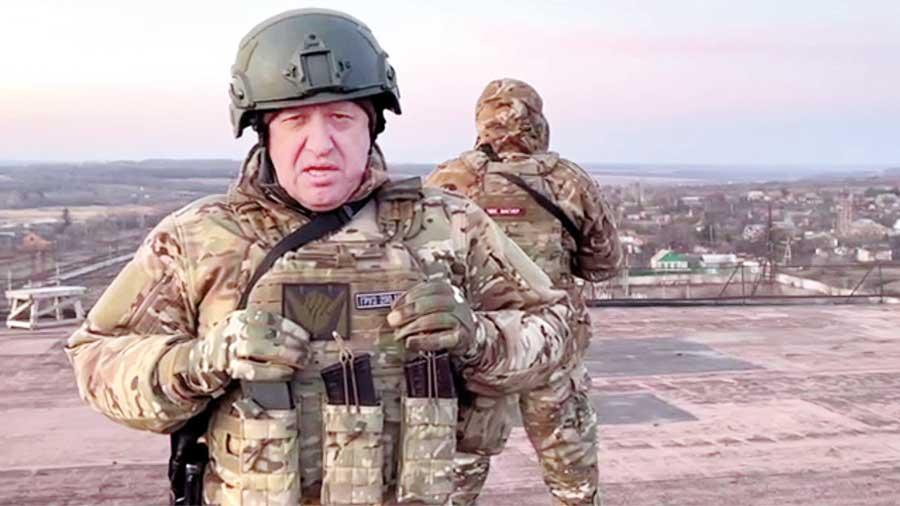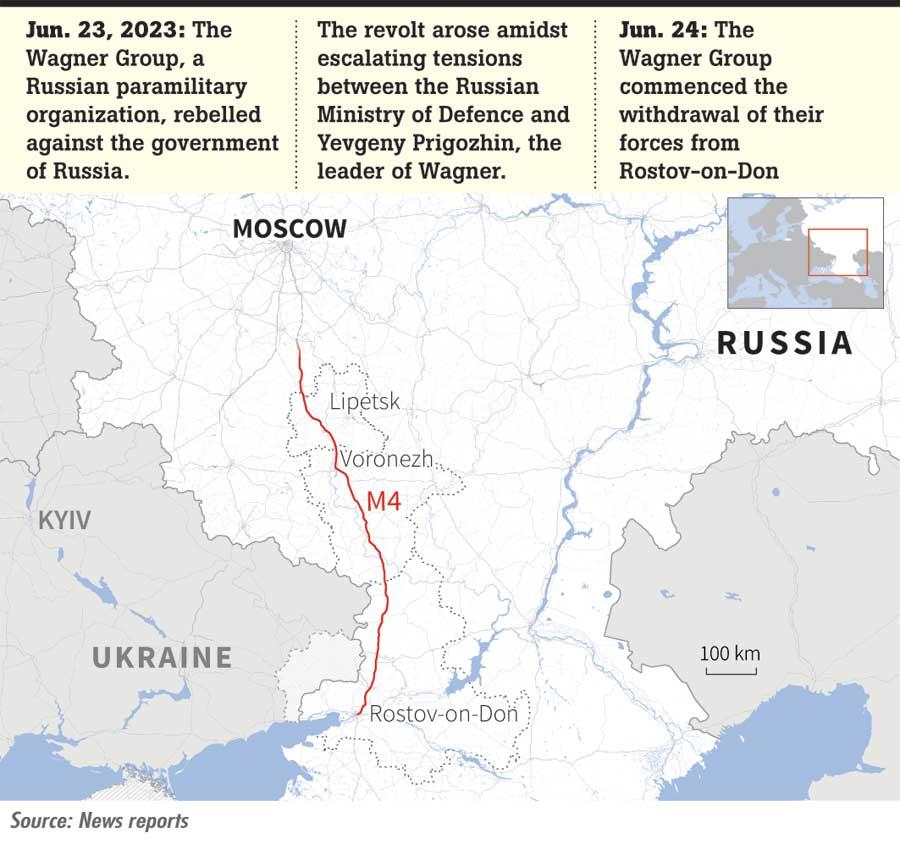30 Jun 2023 - {{hitsCtrl.values.hits}}

Wagner chief Yevgeny Prigozhin
War is too important to be left to the generals. This quote is as relevant today as it was in the early 19th century, when French statesman and journalist Georges Clemenceau first said it to stress the importance of civilian control over the military and the war. If this is so with the generals, then where do mercenaries stand when it comes to decisions on war?
stress the importance of civilian control over the military and the war. If this is so with the generals, then where do mercenaries stand when it comes to decisions on war?
Given this all-important rule of civilian political leadership taking control of the war, last week’s events in Russia lead to two conclusions: Either President Vladimir Putin has not mastered his war studies as the commander in chief of Russia’s armed forces or he has taken a calculated risk by placing his country’s war against Ukraine—call it the war against NATO—in the hands of a mercenary group called the Wagner group. The second possibility appears to have more traction.
Contrary to reports the Western media churned out of last week’s events in Russia, with some viewing them as an unfolding coup, Putin and his military chiefs were well in control and knew of the Wagner rebellion well in advance. It may even be a red herring—a collaboration of sorts between Putin and Wagner Chief Yevgeny Prigozhin to confuse the enemy. Who knows?
Reports say senior Russian General Sergei Surovikin knew of Prigozhin’s rebellion well in advance. He has since been arrested in what was seen as a thickening of the plot. Russia watchers said, however, the Wagner rebellion came as no surprise to the entire Russian leadership, as they were anticipating it and allowing it to happen to achieve political ends. There is much politics behind the plot. After all, war is the continuation of politics by other means. The drama started with Prigozhin launching a public criticism of Russia’s defence establishment, especially Defence Minister Sergei Shoigu, claiming that the defence ministry, by holding back military supplies to the front, was putting his fighters, many of whom were convicts recruited from prisons, in harm’s way.
As the Wagner chief continued his ranting and began to act as though he were the boss, strangely, there was little or no censure from strongman Putin or the military top brass. The West began to see Prigozhin’s criticism with joy, concluding that Putin’s hold on power was being challenged. The West saw the episode as a fissure in Russia’s resolve to fight the war as a united front.
The rebellion happened at a time when the Wagner Group had emerged as a powerful military force. Its victories on the Ukrainian war front had made Prigozhin a national hero. Prigozhin, the presidential chef turned billionaire military contractor, was once a trusted friend of Putin.
He remains so, notwithstanding last Friday’s rebellion and Putin’s description of it as a stab in the back. Prigozhin made it clear that his rebellion was not against Putin or a coup attempt but against the defence establishment, which had ignored his pleas for urgent military supplies to capitalize on the military gains he and his troops had made in the capture of Ukraine’s Bakhmut region.
To assume that Putin was helpless in controlling the Wagner Group chief is political naiveté. Putin was in full control and knew when to strike and in what measure.
For Russia, the Wagner Group, which was registered as a company in 2022, is still useful to carry out its global operations.
The group is allowed to continue its military operations in Syria and Africa, including the war-torn Sudan, while Prigozhin himself was allowed to move into Belarus, which is pro-Russia and shares strategically significant borders with both Russia and Ukraine. His presence in Belarus is a serious concern for Ukraine and NATO, as it was only recently that Russia stationed its nuclear weapons in Belarus. Whether Prigozhin and his senior officers will play a military role in Belarus is a billion-ruble question, though Western critics say he is doomed.
It was Belarus that facilitated the deal between Putin and Prigozhin. The deal is too magnanimous to be true. No arrests were made. The Wagner troops were allowed to go to Belarus or join the military under a new contract.
The Russian military, the police, the border guards, and the internal security force known as Rosguardia restrained themselves even in the face of the rebels’ march towards Moscow. Their non-intervention is unexplainable unless they have received orders from the top not to intervene and let the Wagner Group perform some stunts for the victory-starved West to cheer on.
It is interesting not note why Ukraine and NATO did not make use of the rebellion to gain a military advantage on the war front when the rebellion was ongoing. Their failure shows their weakness. On the contrary, rebellion-hit Russia is still calling the shots, as Wednesday’s missile attack on Ukraine’s capital, Kyiv, indicates.
The rebellion has, instead of weakening Putin, strengthened his hold on power and offered him an opportunity to show he could solve a serious crisis without bloodshed.
Last week’s developments in Russia are too good to be true.
Whatever it is, a nation shall not rely on mercenaries to wage war on its behalf. In 1499, the Italian city state, Florence, depended on mercenaries in its war against Pisa. While the war was raging, Florence’s mercenary army made a retreat when victory was in sight and Pisa was about to discuss a surrender deal. The betrayal by the mercenaries was one of the main political developments that inspired Nicolai Machiavelli to write his famous book, The Prince. Mercenaries were not to be trusted, he said, and insisted the Prince must build on sound foundations and have its own loyal army.
“Mercenaries and auxiliaries are useless and dangerous. If the Prince bases the defence of his state on mercenaries, he will never achieve stability or security. Mercenaries are disunited, thirsty for power, undisciplined, and disloyal,” he wrote.
However, Machiavelli did not outright dismiss the use of mercenaries. He advocated for caution and a nuanced approach. He proposed that a wise ruler should maintain a core standing army loyal to the state while judiciously supplementing it with select mercenaries when necessary. This is exactly what Putin has done.
Many states in their fight against terrorism have worked with mercenary outfits which are no respecters of rules of warfare or human rights. It has happened in Sri Lanka during the 1988-90 insurrection and the separatist war against the LTTE.
Over time, the role the mercenaries have played has become sophisticated. The Americans had Blackwater mercenaries to carry out their dirty work in Iraq. Britain has SAS – Special Air Service, a military unit comprising largely foreign fighters. Information regarding this secretive group is highly classified.
Though in the Western media, the Wagner group is portrayed as mercenaries, foreigners who fight alongside Ukrainian soldiers are glorified as volunteers who have signed up to fight Russian aggression.
In the end, it is all a game of nomenclature. Just as the saying ‘one’s terrorist is another’s freedom fighter’ goes, one’s mercenary is another’s volunteer hero who ‘fights for a cause’.

30 Dec 2024 26 minute ago
29 Dec 2024 2 hours ago
29 Dec 2024 4 hours ago
29 Dec 2024 4 hours ago
29 Dec 2024 6 hours ago